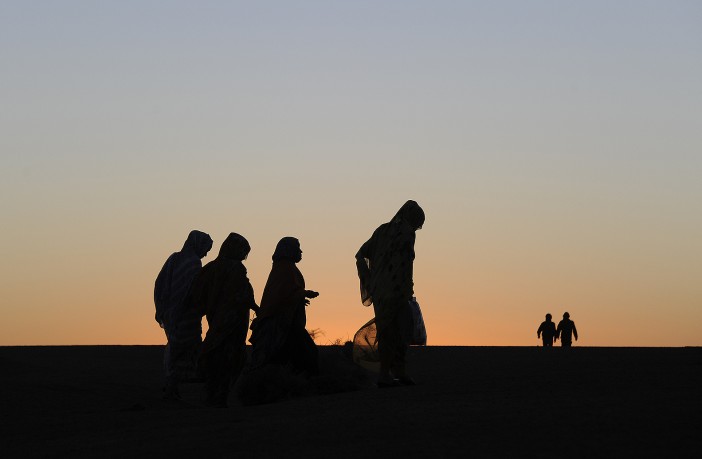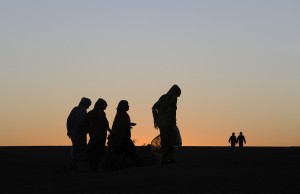The Hill
by Alison Lake Benadada
Love and patriotism are difficult emotions to fake. Last week, Moroccans around the world commemorated a peaceful march that 40 years ago declared Morocco’s historical claim to its beloved Saharan lands. King Mohamed VI, who is devoted to the cause of the nation’s claim to its southern provinces, continues to draw crowds and support.
With its diverse regions, dialects, ethnicities and political views, Morocco is by no means a monolithic nation. But its support behind the king and the “Moroccan Sahara” is well more than the majority. And it’s hard to discount Morocco’s economic and administrative presence in Western Sahara for the last four decades.
Furthermore, any move that would acquiesce to the demands of a minority campaign for self-determination in the Sahara—that of the Polisario Front—would cause instability and invite participation from a group ill-equipped even to administer its own rudimentary camps in the Algerian desert.
On Nov. 6, 1975, more than 350,000 Moroccans marched peacefully into Spanish Sahara with flags and Qurans to proclaim the land they viewed as traditionally Moroccan. That massive demonstration, which turned the tide away from colonial control in the region, prompted Spain to relinquish territory to Morocco less than two weeks later in the Madrid Accords.
Western governments struggle to fully relate to the motivations of a North African monarch whose power is not comfortably benign like that of the British royal family, and might prefer that Morocco adopt a purely Western brand of democracy. But it’s hard to dispute that most Moroccans love their king, even in a climate where dissension is not tolerated on the topics of the royal family, Islam and the Western Sahara. And, more importantly for the United States and Europe, Morocco has proven itself a formidable regional ally in matters of security, intelligence, counterterrorism and economic development.
In addition to the fact of Morocco’s historic claim to the Western Sahara region, it’s worth considering that the drive to expand territory and capture resources has been in the DNA of tribes and nations since the dawn of time. Expansionism by nations has been a reality throughout history, and the history of the United States brings to mind numerous examples—consider the Spanish-American War, the French and Indian War and other self-serving U.S. territory grabs around the globe. That reality invalidates any diplomatic claim that Western Sahara is not Moroccan since it was annexed and subsequently sparked a conflict. If that were true, then no territory acquired as a result of conflict would be valid.
This history should be kept in mind as nations (and furniture retailers like Ikea) consider whether to fully support Moroccan sovereignty over Western Sahara. Western governments, which do not want to appear politically incorrect and discount a desire of Saharans for their own nation, have allowed this conflict to simmer well into the 21stcentury, rather than recognize Morocco’s decades of rule and historical claim to the area. The territory’s disputed status has persisted due to opposition from the Algerian-backed Polisario Front—originally a Marxist puppet regime backed by Cuba—which maintains a noisy lobby in both Europe and the United States and attracts hapless celebrities to its cause.
The original conflict between Polisario guerilla forces and the Moroccan military was indeed bloody and displaced native Saharans. Some of them and their descendants are housed in dismal camps in southwest Algeria, whose government refuses them full citizenship and residency rights. Yet the Moroccan government has consistently maintained a policy of repatriation to those who wish to return. “Following the epic achievement of liberating our land and shoring up peace and security, our country has sought to enable the Saharan populations to become full-fledged citizens and enjoy a dignified life,” King Mohamed VI said on Nov. 6 during a speech in Laayoune, Morocco’s regional capital of Western Sahara.
The Moroccan king is well loved, and has always been perceived as a monarch of the people. He enjoys driving himself around Casablanca and Rabat, and bestows jobs and other benefits to average people he meets on street corners. Indeed, the country has a long way to go to meet all the needs of its impoverished citizens, and this kind of random generosity might not solve problems long term. But Moroccans stand by their king and by their country’s territorial integrity. That’s not a sentiment that Western governments should overlook.
Following on the policies of his father King Hassan II, Mohamed VI has made a significant investment over the years in the socioeconomic affairs of the Moroccan Sahara. “As a result of these policies, the human development indicators in the region which, four decades ago, were lower than those in the rest of Morocco, are today much higher than the national average,” wrote J. Peter Pham, Director of the Atlantic Council’s Africa Center.
While Morocco might not exactly fit Western expectations for democracy and transparent government, the nation has definitively delivered on its commitment to regional security, cross-border trade, tourism and cultural cooperation, unlike its neighbor to the east. And its presence and investment in the south has been well established for almost half a century.
The United States and Morocco are long-time allies, and both the U.N. Security Council and Obama administration have called Morocco’s autonomy plan for Western Sahara serious and credible. It’s time for these governments to fully recognize that Western Sahara is Moroccan, and to pressure the Algerian government to accord basic rights to refugees of this 20th century conflict.
Benadada is a writer and editor based in Washington, D.C.








